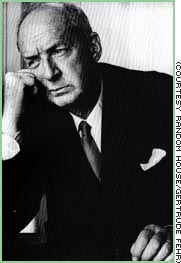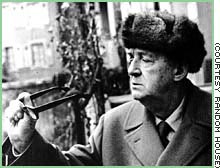MAIN | BIOGRAPHY | PICTORIAL BIO | BUTTERFLIES PHOTO ESSAY | LOLITA'S IMPACT
ARCHIVES | ROADMAP | LOLITA AND MORALITY | QUIZ | POLL | BOARDS | LINKS
His Legacy

|
|
| "He's very much a writer's writer and for that he will be remembered," says Galya Diment, Professor of Russian at University of Washington | |
April 9, 1999
Web posted at: 5:35 p.m. EDT (2135 GMT)
(CNN) -- Scholars say Vladimir Nabokov will go down as one of the greatest original writers ever. He is the man who penned the most controversial novel of the 20th century, a book that has been termed both "the only convincing love story of our century" and "pornography," and still causes controversy 50 years after its release.
But he also created a startling breadth of quality work that supports, matches and even surpasses the heights of talent he reached with the novel "Lolita."
"He will be increasingly appreciated," says Jeff Edmunds, editor of Zembla, the Web site dedicated to Nabokov and his work. "He crosses national boundaries ... he's not considered a modernist, or post-modernist ... He's simply Nabokov."
D. Barton Johnson, Professor Emeritus at University of California - Santa Barbara and former president of the International Vladimir Nabokov Society, agrees.
"There can, I think, be no question that Nabokov is and will remain a prominent figure in the 20th Century canon -- at least in American and Russian literature," Johnson says. "Nabokov is one of the rare figures who, at the end of the century, enjoys both a wide popular readership and is firmly entrenched in academe."

|
|
| Nabokov writing at his lectern, Montreux, 1966 | |
Galya Diment, Professor of Russian at University of Washington and the author of "Pniniad: Vladimir Nabokov and Marc Szeftel," says Nabokov's legacy is often split into two different directions.
"I think in the general public he will be remembered mostly for 'Lolita," she says. "But he's very much a writer's writer and for that he will be remembered, as well."
Nabokov spent his life dedicated to the craft of writing, working with words from his early teens to his late 70s. He wrote his first 10 novels in Russian, the final ten in English (one, "The Original of Laura," was never finished). Through the years, his style evolved, stengthening to a crafty, ambiguous yet controlled monster as he grew older.
When he wrote "Lolita," his 1950s novel of pedophiliac obsession, he crossed boundaries that opened the door to new readers.
Johnson says "Lolita" serves as a touchstone to Nabokov's work, but his universality comes from his style.
|
"Much of his popular appeal derives from the reputation of 'Lolita' and its film versions, but Nabokov's novels, unlike those of many modernist writers, have strong and often lurid plot lines and characters that hold the interest of the general reader," he says.
But "Lolita" is the work most people will remember. Everywhere you look today, Lolita's effect is seen, from the Long Island Lolita (Amy Fisher's nickname) to a Lolita brand of underwear, from movies bearing her name, to pop songs like the Police's "Don't Stand So Close to Me" (in which, Nabokov's name is mispronounced by Sting -- it's Na-BOH-kov, not NA-bah-kahv).
"You cannot imagine U.S. or European culture without 'Lolita,'" Diment says. "It's amazing all the places where you find the references to 'Lolita.' And it's bigger than the novel ... People who never read it or saw the 'Lolita' movies know what it means and are familiar with the phenomenon."
But that doesn't mean "Lolita" represents his best writing.
"He's written other books he would place above 'Lolita' as far as the quality of writing is concerned," says Edmunds, who points out that Nabokov's encompassing 1969 "Ada or Ardor: A Family Chronicle" was what Nabokov considered his best work. It was "the pearl of American literature," Nabokov said.

|
|
| Because he was considered a "White Russian émigré" who practiced "literary snobbism," Nabokov was not published in the Soviet Union until 1986 | |
Diment picks "Pnin," the novel about a professor of Russian at an American college, who lectures in a language he cannot master. It was released in 1957, before "Lolita" was released on American shores, but after it was causing a stir in Europe.
"That's actually what gave Nabokov fame prior to 'Lolita,'" Diment says.
Now, as the world celebrates the centennial of his birth, there is no question whether or not Nabokov's work will stand the test of time. While Johnson believes colleges and universities are ensuring his legacy, Edmunds thinks there is still work to be done.
"I can't count how many graduate students I have encountered who have never read any of his work, and are really rather ignorant of his writing or his legacy," says Edmunds.
|
But all agree that Nabokov will become more popular in the new century.
"He is remembered and will be remembered much more," says Diment. "Into the 21st century, he will only solidify his hold on the elite writers."
"I have no doubt that, while his reputation will have its ups and downs," says Johnson, "his work will still be read in 2099 and that his name will appear in literary histories written in 2999 -- if anything is read at all."